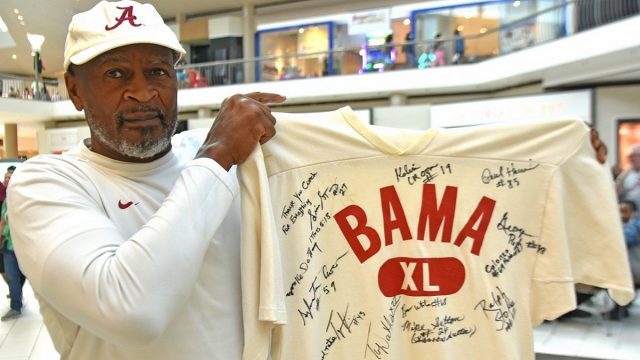
George Pugh said it was about time that the first 27 Blacks to be on the University of Alabama football team were remembered and recognized.
Fifty years later, it finally happened.
“It’s long overdue. Way overdue,” said Pugh, who was one of those men. “This is something that should have happened maybe 10, 15, 20 years ago. But the fact of the matter is that tonight is the night.”
The night of Dec. 18 was the Night of Legends, an event that honored the Black athletes who paved the way for all Alabama Legends. The 2021 season marks 50 years since coach Paul “Bear” Bryant fielded the first integrated team. The move paved the way for more Black athletes to participate in the Crimson Tide football program, which has set a standard in college football.
The centerpiece of the night’s festivities was a crystal trophy, shaped like a football that sat on the backs of a pair of elephants. The glistening prize sat on a base with the 27 names of the first Black Tide football players under the title “The Beginning.”
The trophy will be displayed in the Paul Bryant Museum.
Brothers Sylvester Croom, Kelvin Croom reflect on their days as Alabama football pioneers from Alabama NewsCenter on Vimeo.
Pugh wore two hats during the festivities, which included an autograph session for Tide fans. He was an honoree and an organizer, along with former Alabama player Jeremiah Castille. Their two-year dream ultimately came to fruition.
“We were the first group of Blacks to enter the University of Alabama as students as well as athletes,” Pugh said. “To come together today and tonight in the fellowship and to give thanks and praise to the man who made it all possible for us, it’s just an honor.
“I’m speaking of Paul ‘Bear’ Bryant,” he continued. “He was brave enough to go against all grains and make it all possible for us to have an opportunity to play at the University of Alabama. It wasn’t easy for him, as we well know. But we braved those treacherous waters, and we did it the right way. We did it with dignity. We did it with pride. We did it with respect.”
More importantly, Pugh said, all 27 of those student-athletes graduated from the university.
Ralph Stokes was the first Black running back at Alabama. He never envisioned being called a legend. He and Chris McKinney wrote the book “One of the First: Lessons I Learned While Overcoming the Challenges of Integration.”
“We were there. Sylvester Croom, Mike Watson, myself, Wilbur Jackson and John Mitchell were the first five African American players on campus,” Stokes said. “We were just there to play football and try to do the best we could playing football.
“We knew we were opening doors, but it wasn’t ever a thought of becoming a legend or becoming someone special,” he said. “You just knew you were there to open a door.”
Paul Harris admits he initially didn’t want to attend the University of Alabama.
“I heard about so much racism and segregation,” recalled Harris, whose teammates called him Sweet Pea. “I had been through that in Mobile and I said I did not want to go there.”
Harris considered historically Black Alabama State and Alabama A&M universities. After a couple of visits and meeting his fellow Black recruits, he decided to give the Tide a try.
The black-tie event was a fundraiser for the Jeremiah Castille Foundation, which focuses on mentoring. Castille grew up in a dysfunctional home filled with abuse, domestic violence and alcoholism, and his successes were the direct result of mentors in his life, according to the foundation’s website.
Most notably, it said, “Bear” Bryant instilled discipline and leadership into Castille’s life, teaching him that with a positive attitude, a strong work ethic and integrity, he could do great things. Bryant’s guidance and Castille’s resolve led the cornerback to numerous successes including being selected MVP in Bryant’s last Liberty Bowl game.
Asked about race relations today compared to his football days at Alabama, Pugh said it’s an ongoing process.
“There are always things that you can do better,” he said. “But I think that it’s not how you start. It’s how you finish. And I think that once it’s all said and done, we can look back and we can say, ‘Job well done.’”
Pugh was asked about current Alabama sophomore quarterback Bryce Young, a Black player who was recently awarded the Heisman Trophy as the best player in college football. In his playing days, there was no notion of a Black player taking snaps at quarterback.
“Well, we proved them wrong,” Pugh said. “We proved them wrong with the first Black quarterback at Alabama, who was Walter Lewis. We’ve come full circle now and we have a Black Heisman Trophy winner (at quarterback).
“Before Bryce, there was John Mitchell, there was Henry Jackson, there was Colenzo Hubbard, there was Woodrow Lowe,” Pugh continued. “We’ve made it possible so that young men like Bryce Young can come to the University of Alabama and win the Heisman Trophy. We were the beginning.”
The Legends
Wilbur Jackson
John Mitchell
James Taylor
Mike Washington
Ralph Stokes
Sylvester Croom
Tyrone King
Woodrow Lowe
George Pugh
Calvin Culliver
Paul Harris
Colenzo Hubbard
Gus White
Willie Shelby
Sam Tate
Johnny Davis
Mike Dottorey
Terry Jones
Ozzie Newsome
Calvin Richardson
Mike Sutton
Wiley Barnes
Kelvin Croom
Loun Ikner
Tony Nathan
Calvin Parker
Willie McCray








